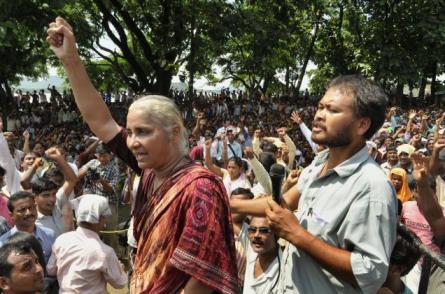
Narmada Bachao Andolan leader Medha Patkar with the leader of Krishak Mukti Sangram Samiti Akhil Gogoi at a protest rally on the Assam-Arunachal Pradesh border in Guwahati. Photo: Ritu Raj Konwar
Today in the jungles of Dantewada, it is paying the price for its follies, saysAshish Chadha.
It was during the Manibeli satyagraha of August 1991 that I met People’s War Group (PWG) activists in the Narmada Valley for the first time. The river was flowing above the danger mark thanks to incessant rain. Manibeli, a small tribal hamlet on the Maharashtra side of the river, was threatened with imminent submergence – the first victim of the Sardar Sarovar Project. But it was not going to go down with a whimper. The Narmada Bachao Andolan (NBA) had announced a jal-samarpan, a radical form of Gandhian non-violent protest that captured the imagination of the nation.
Medha Patkar along with a motley group of driven NBA activists and adivasis had decided to ‘sacrifice’ themselves in the sacred river. The largest non-violent movements in India after Mahatma Gandhi was challenging the might of the nation by sacrificing itself at the altar of development. Not a mere symbolic gesture or waive defiance, but a visceral end to a peaceful struggle.
The NBA feared that the State would violently suppress the protest. Many grassroots activists, intellectuals, journalists and students from all across India had come to show solidarity with this group of satyagrahis as they fought a battle of survival and ideology. We were camping next to the medieval Shoolpanewsar temple, secretly hoping that the Narmada River would not rise further.
Other than waiting for police action to happen, attending strategy meetings, and singing Andolan songs, we would usually sit in the ancient corridors of the eroded temple chatting about the state of the world. It was during one of these engrossing conversations that one of the PWG activists, in his halting, Telugu-accented Hindi, informed us: “We told Medha-tai to let us lead the moment for just one day. We will see to it that this dam is never made. Gandhian non-violence will not do you any good. You don’t know this government. it will trample you. It will mercilessly crush you.” I remember vigorously justifying the non-violent ideological basis of NBA. Today, nearly 20 years later, sitting in an American university campus, reading daily about the growing crisis in Dantewara, I am forced to eat my words.
“This is different from the Naxalite violence of the 60s and the 70s,” I was explaining to a Pakistani friend – a card-carrying communist who fled Pakistan 30 years ago when Zia ul-Haq’s regime brutally crushed trade unions and the communist party there. “This is not our battle, it is theirs. It is actually a people’s movement. It is a movement of the oppressed people, by the oppressed people, for the oppressed people.” On a long-distance telephone conversation, from the East coast of the West coast of America, I was explaining to him the recent slaughter of security personnel in Dantewada by the Maoists. “this is different because this time there is no Brahmin, no intellectual, no middle-class activists leading them. This time there is no one from Calcutta, Bombay or Jawaharlal Nehru University. This is their war of survival. And they are fighting their way. The rage is inevitable.” He was troubled. We are all troubled by the ferocity of the violence.
The core issue for the Maoist movement resonates with that of the NBA. Today’s Maoist movement in central india is unique. For the first time in the history of the communist movement in India, it’s not just the foundational questions of class and agrarian relations that are being raised, but also those of key issues of development, environmental destruction, post-colonial ideology of progress – problems the NBA fought for 20 years. Ours was an on-violent struggle, and today the movement is finished, the dam is complete, waters have not reached the most needy in Kutch and the displaced are devastated. A movement in shambles, its people lost, tired and hopeless. It is in the anguish of the NBA’s collapse that the Maoists have emerged.
The Indian government mocked the NBA’s quest. It humiliated it. It suppressed it. Today in the jungles of Dantewada, it is paying the price for its follies. The Maoist movement is not a law and order problem as Home Minister P. Chidambaram would want us to believe. It is not a political problem. It is a social problem. It is an ethical problem. It is a moral problem. The Indian State has to own up the responsibility of its systemic failure – the failure to govern.
In an early morning sweep of August 3, 1991, a few hundred policemen form Dhule district raided Manibeli and arrested Medha Patkar and the satyagrahis along with 63 people. The PWG activists and I evaded arrest and escaped to Baroda. As the rickety Gujarat State Transport bus navigated the potholed highway lined with babul trees, one of the PWG activists ponderously whispered in my ear, almost like a solemn dialogue from a Hindi fild: “This Gandhi-wadi will not get you anywhere. Government ko baandook ki gunje sonaye deti hai(the government only recognizes the sound of the gun)”.
(Ashish Chadha teaches anthropology at Yale University.)
No comments:
Post a Comment